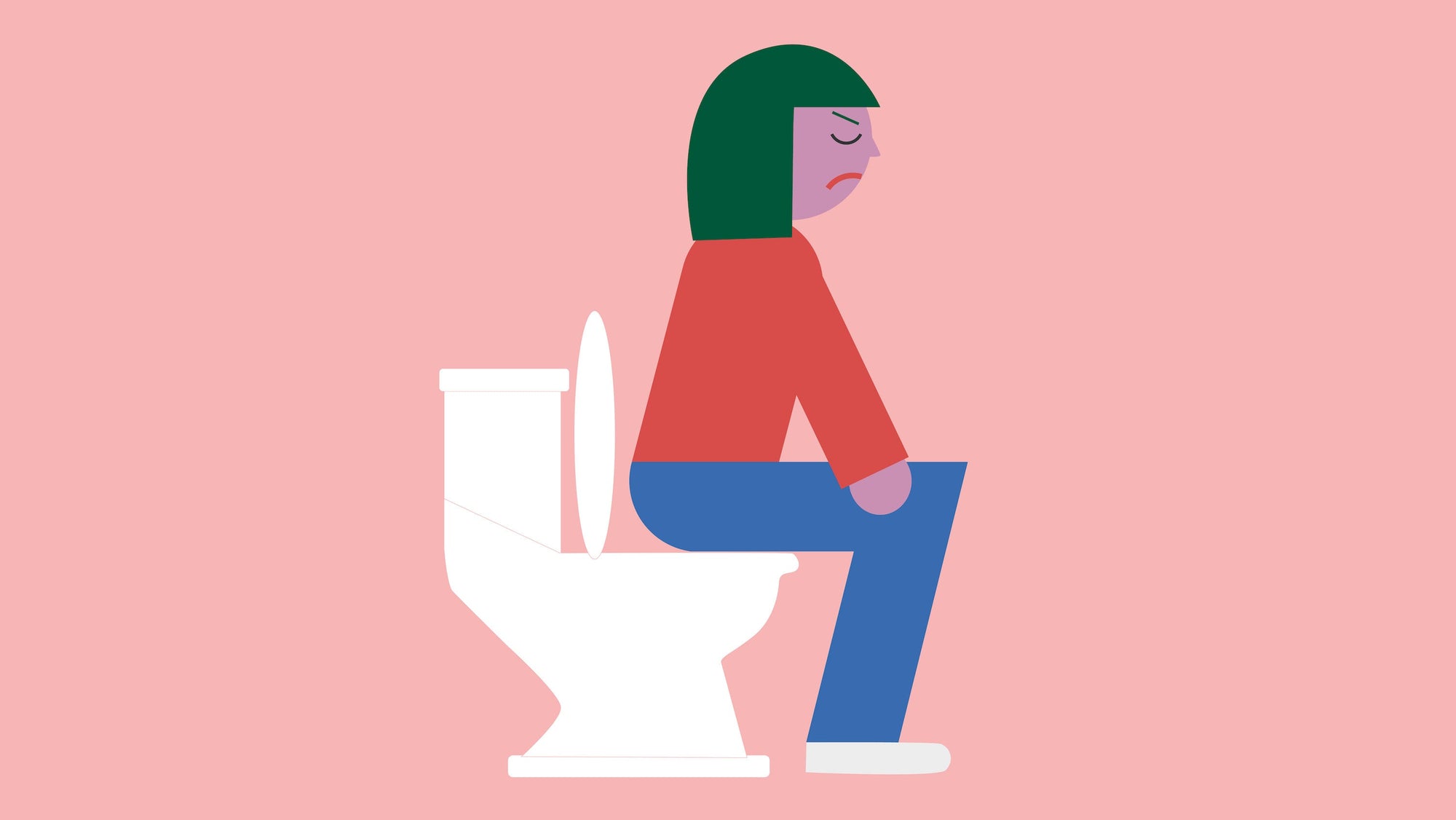

· By Alicia Stacey
Constipation 101: What You Need to Know
Poopin’ ain’t easy—not for everyone, at least. If you find that you haven’t been going frequently, or have to strain when you do, it’s possible that you’re suffering from constipation. No need to be ashamed; at least 2.5 million Americans deal with constipation, too, so it’s a pretty common issue. And the good news is, in many cases, it can be fixed quite easily.
Read on to find out what could be causing your constipation, and the simple steps you can take to get some relief.
What is Constipation?
First, let’s talk about how poop is made: After your body digests your food, your colon absorbs water from what’s left over. That water, plus waste, are what make up your stool. It then moves from your colon to your rectum, then it’s smooth sailing out to your toilet.
Constipation is what can happen when this process isn’t so smooth. If this all happens too slowly, your body has a hard time getting rid of the waste, causing you to have infrequent bowel movements. When you do go, you have dry, hard poop that’s difficult to pass.
At least 2.5 million Americans deal with constipation.
Symptoms of Constipation
These are common symptoms of constipation:
- Pooping no more than three times a week
- Stomach aches and abdominal cramps
- Feeling bloated
- Taking a long time to poo
- Having to push when you go
- Stool that’s dry, hard, lumpy, and longer than usual
- Feeling full even after you’ve used the bathroom
- Nausea
In addition to these symptoms, these are signs that your kid may be constipated:
- Irritable or angry behavior
- A firm tummy
- Not being as hungry as usual
- Having a lack of energy
What Causes Constipation?
There are many possible causes for constipation in adults, such as holding in your poop, hormonal issues, pregnancy, or diseases such as diabetes, Parkinson’s, or stroke. Here are some other causes:
Diet
Eating too much junk and processed foods can contribute to constipation. The same goes for high-fat foods like cheese, red meat, and eggs.
Lack of Physical Activity
Not being active enough is one possible cause of constipation, so having a job that requires you to sit for extended periods of time could worsen your likelihood of developing it.
Medications
Some treatments can increase the risk of suffering constipation, such as:
- Opioid pain relief drugs, including codeine, hydromorphone (Dilaudid), and oxycodone (OxyContin)
- Tricyclic antidepressants, including amitriptyline (Elavil) and imipramine (Tofranil)
- Anticonvulsants, including phenytoin (Dilantin) and carbamazepine (Tegretol)
- Calcium channel blockers, used to lower blood pressure and regulate heart rate
- Antacids that contain aluminum, like Amphojel and Basaljel
- Antacids that contain calcium, like Tums
- Diuretics, which eliminate excess fluid from the body
- Iron supplements, used to treat iron deficiency anemia.
Age
According to some studies, aging can increase someone’s risk of constipation from 40% to 60%. This could be because some of the things that cause constipation, like lack of mobility, poor dietary choices, and medications, are more common with age.
Irritable Bowel Syndrome
It’s not uncommon for people with IBS to experience constipation as part of their symptoms.
Traveling
Ever get constipated when you travel? You’re not alone. About 9% of regular travelers deal with it, likely because of the frequent, dramatic disruption to their daily routines.
Laxative Abuse
Taking laxatives more than you need to could actually cause your body to become dependent on them in order for you to poop—it’s why those who overuse laxatives may find that they need higher doses over time in order for the laxatives to be effective.
In addition to causing constipation, abusing laxatives can lead to dehydration, internal organ damage, and a dangerous imbalance of electrolytes, threatening one’s overall health.
A psyllium husk fiber supplement can not only keep you on track with your daily fiber intake, but also relieve and prevent constipation.
When Should You See a Doctor About Constipation?
Seek medical attention if you’ve been experiencing any of these complications:
- Constipation that lasts more than three weeks
- Blood in your stool
- Unbearable abdominal pain
- Pain during bowel movements
- Sudden weight loss
- Constipation that doesn’t respond to any changes
How Can You Treat Constipation?
Eat More Fiber!
Getting more fiber in your diet can have significant benefits, like promoting regular bowel movements and keeping you properly hydrated. A psyllium husk fiber supplement like Bellway can not only keep you on track with your daily fiber intake, but also relieve and prevent constipation. As with all supplements, confirm with your doctor that it's right for you before starting a fiber supplement regimen.
Change Up Your Diet
Drinking plenty of water every day and eating high-fiber foods like fruits, vegetables, whole grains, and oats can help promote healthy digestion and keep your poop moving like it should be.
Make Some Lifestyle Changes
Exercising regularly, aiming to take your number 2s at the same time every day, and avoiding delaying your urge to go are some ways to help treat constipation. Also, keeping your knees above hip level when pooping is said to make things easier, so consider buying a small stool to raise your feet when you’re on the toilet.
